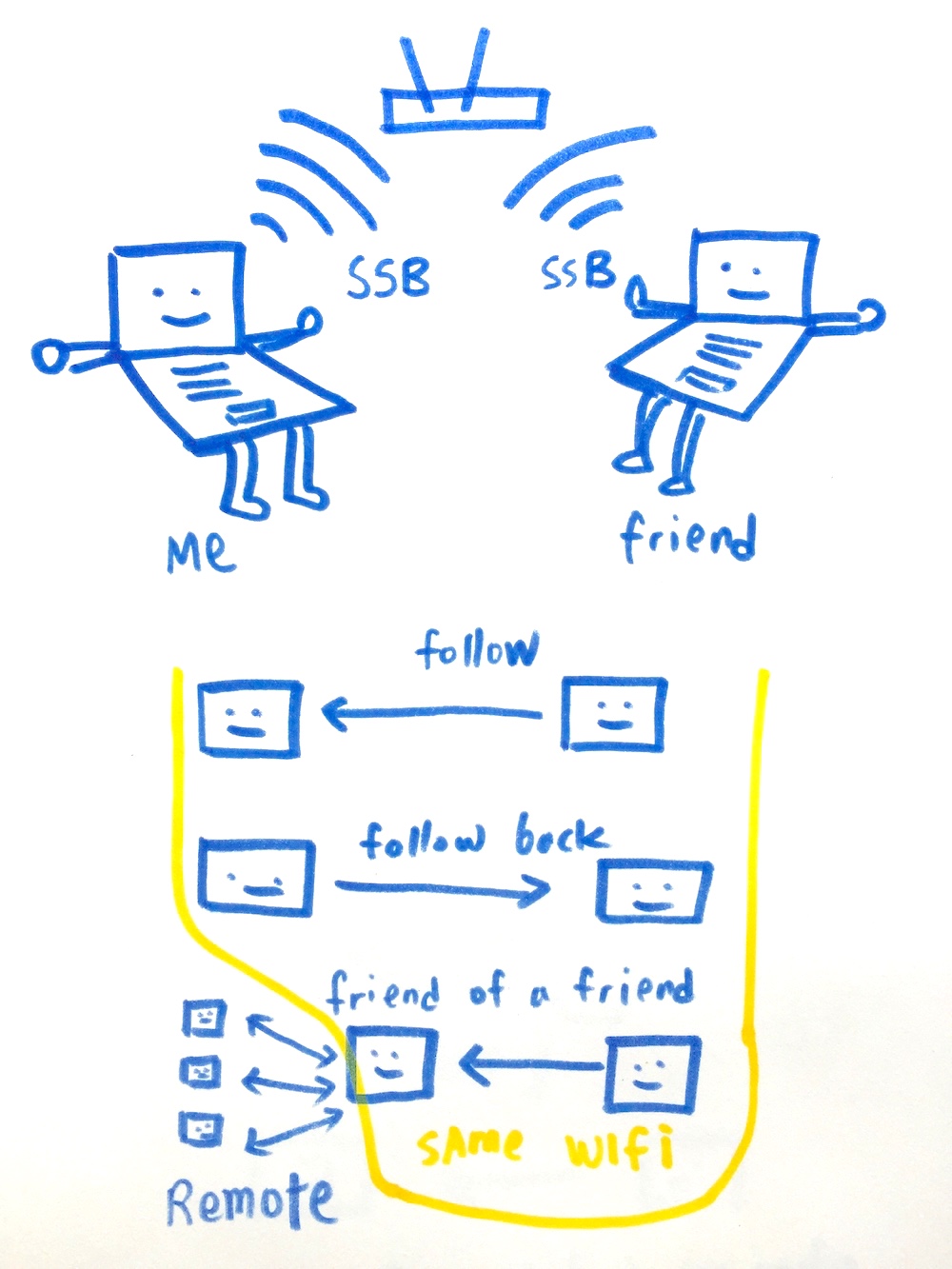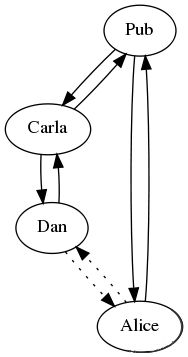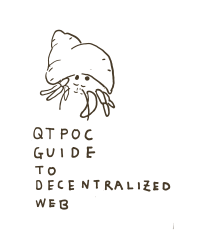Distributed Web of Care
Announcing Decentralized Networks Workshop
Free, public workshop for the WYFY School, in partnership with BUFU. 8.11.2019 6:30 - 8 p.m. at the School for Poetic Computation, NYC. This posting is a work in progress guide for Decentralized Networks Workshop.
Centralized Networks
- Social media: Instagram
- Cloud computing: Amazon Web Services
- Cloud storage: Google Drives
- Postscript on the Societies of Control by Gilles Delueze
- Control Society by Taeyoon Choi
- Capitalization of attention economy: How to do Nothing: Resisting Attention Economy by Jenny Odell
- Erasure or overexposure of the marginalized communities: The internet thinks you’re a robot, and other ‘dark patterns’ people with disabilities face online by Ariel Bogle
- “If memes reiterate the inequities between black creators and white appropriators, can they also move us into a new collective blackness?” Poor Meme, Rich Meme by Aria Dean

Decentralized Networks
1. Silicon Valley Perspectives
- History of Utopias and idealism
- Hackers and counterculture
- The Whole Earth Catalogue
- Information sovereignty
- “Information wants to be free”
- Suburbanization of the Web: Squarespace

2. A variety of decentralizations
- Community networks: Digital Stewards Training and Digital Defense Playbook by Detroit Community Technology Project
- Peer to Peer protocols: Hong Kong’s protesters put AirDrop to ingenious use to breach China’s Firewall
- Mesh network: NYC Mesh and DWEB Camp Mesh topology
- Offline first: El Paquete Semanal in Cuba
- Solar-powered:LOW←TECH MAGAZINE
- Association for Progressive Communications
- How is a users’ privacy honored in each cases?
- How is a users’ identity defined in each cases?
3. An alternative to Google Drives
- Dat
- How-to Demonstrations
- Art projects: Dat Zine Library by Zach Manderville, ‘For the Birds’ Podcast

4. An alternative to Instagram
- Secure Scuttlebutt(SSB)
- Friendly new site
- How-to Demonstrations
- Principles: “Environment reflecting Technology reflecting Community reflecting Society.”
- Network Topology: “it maps a the social network on to a computer network that is essentially the same topology! that is, the connections between humans maps approximately to the the connections between computers. if you follow someone, you really actually follow them at the data layer.”
SSB concepts and terms
- Identity: “The private key is your secret not to be shared with anyone. The public key is used as your identifier.”
- Local first: “offline first” Peer to Peer protocol
- Feed: “A feed is a signed append-only sequence of messages. Each identity has exactly one feed.”
- Append-only log: Once you publish, you can’t edit or delete
- Global Gossip Network: Gossip protocol

- What actually happens?:Protocol guide
- Client: Patchwork and Patchbay, what are the differences?
- Friend hops: Show hops option in Patchbay
- Pub: ‘Always-online friend,’ SSB on a server which you can follow to connect with friends remotely
- SSB Community: Scuttle Camp
- Conversations on SSB: A reading group about ‘White fragility,’ discussion about ‘Decolonizing technology,’ a channel about ‘Vegan junkfood’ and etc
- Creative projects: Scuttlebooth

5. QTPOC perspectives
- A conversation about conflict of needs: Preservation of privacy and intimacy versus Openness and inclusivity
- Abuse, misuse, harassment scenarios: White supremacy, hate speech and toxic masculine behaviors
- Decolonizing the internet
- Honoring the indigeneous and traditional communities, land and the environment
- Deaf and Disabled rights on the Decentralized web
6. Critical perspectives
- Corporate appropriations and re-centralization
- “Decentralization is not the goal. Orthogonality of Data, Transport, Identity ‘not used to capture each other, they are 90 degrees from each other’ for Information freedom and user agency. For a sense of self and privacy” - Peter Wang’s talk at the DWEB Camp
- Military contracts: Brooklyn Start Up GoTenna lands a contract with the Department of Homeland Security, U.S. Customs and Border Protection
7. Group discussion
- QTPOC safe space on Decentralized Web
- Code of conduct and community stewardship
- Copyright versus ownership of ideas and identity
8 . Leaving with a positive note
- Three protocols and a future of the decentralized internet by Darius Kazemi
- Run your own social:How to run a small social network site for your friends by Darius Kazemi
- Our Networks in Toronto
- Radical Networks in New York
- Allied Media Conference in Detroit
- DWEB Camp in San Francisco
- Remembering the First DWeb Camp, July 2019 By Frances Sawyer
- The Internet’s Old Guard By Jay Graber
- Transforming Ourselves to Transform Our Networks by mai ishikawa sutton
9. A case for emergent networks
- “trust the people and they become trustworthy. trust the people and you will become trustworthy.” trust the people by adrienne maree brown
- “We are not idealistic. Decentralization is not a solution to the problems of the centralized networks. However, we are not pessimistic. Decentralized networks, when they are designed by the folx traditionally marginalized from the networks, LGBTQPOC, Deaf, Disabled, Indigenous and traditional communities, can lead to an equitable, distribtued web of care.” by Taeyoon Choi
10. Activity suggestions
- Create an append-only journal with peers
- Build your own social network with peers
- Role play a situation for community stewardship and protection
- List your priorities for data privacy
- Map your ‘orthogonal’ approach for a better web
Support
Much love for BUFU, The School for Poetic Computation, SFPC Code Societies and Melanie Hoff for supporting the WYFY School, Flawless Hacks for supporting the ‘work in progress’ zine and the DWEB Camp and the Secure Scuttlebutt community.

Distributed Web of Care is an initiative to code to care and code carefully.
The project imagines the future of the internet and consider what care means for a technologically-oriented future. The project focuses on personhood in relation to accessibility, identity, and the environment, with the intention of creating a distributed future that’s built with trust and care, where diverse communities are prioritized and supported.
The project is composed of collaborations, educational resources, skillshares, an editorial platform, and performance. Announcements and documentation are hosted on this site, as well as essays by select artists, technologists, and activists.
-
Jun 30, 2024
에콜로지컬 퓨쳐스
-
Jun 30, 2024
Ecological Futures
-
Nov 26, 2022
P2P Residency Berlin
-
Jan 4, 2022
garden.local
-
Jun 7, 2020
Community Over Commodity
-
Mar 18, 2020
Oddkins
-
Oct 10, 2019
New Merchandise
-
Aug 10, 2019
Announcing Decentralized Networks Workshop
-
May 24, 2019
On Stewardship
-
May 23, 2019
Movement Scores
-
May 4, 2019
Who Owns the Stars: The Trouble with Urbit
-
May 1, 2019
Announcing WYFY School with BUFU
-
Mar 5, 2019
Announcing Lecture Performance at the Whitney Museum
-
Feb 25, 2019
Announcing Call for Deaf or Disabled Stewards
-
Feb 7, 2019
Making Space in Online Archives
-
Jan 29, 2019
Accessibility Dreams
-
Jan 28, 2019
Creative Self Publishing
-
Jan 11, 2019
Racial Justice in the Distributed Web
-
Dec 29, 2018
Announcing LACA Residency
-
Dec 28, 2018
Announcing DWC at Code Societies
-
Dec 21, 2018
Building a Museum 353 Years in the Future
-
Sep 11, 2018
Finding Intimacy within Black Feminist Criticism
-
Jul 26, 2018
still stuck with words
-
Jul 26, 2018
Distributed Dance Floor
-
Jun 27, 2018
Announcing Skillshares: Peers in Practice
-
Jun 27, 2018
Announcing the Distributed Web of Care Party
-
Jun 27, 2018
Communities and New Infrastructures
-
Jun 27, 2018
New Gardens
-
May 20, 2018
Announcing Summer 2018 Fellows
-
Apr 28, 2018
DWC Merchandise: Care Shirt & Hoodie
-
Apr 27, 2018
Announcing Artists in Residence at Ace Hotel New York
-
Apr 18, 2018
Documentation: Ethics and Archiving the Web
-
Apr 18, 2018
Call for Fellows and Stewards
-
Apr 17, 2018
Code of Conduct
-
Mar 18, 2018
About
-
Distributed Web of Care
